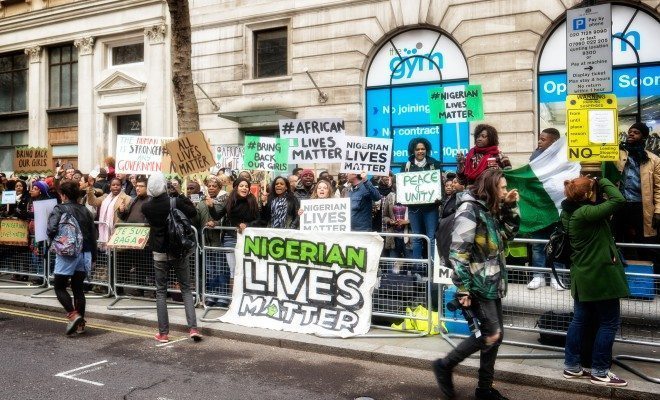 "Nigerian Lives Matter" courtesy of [Garry Knight via Flickr]
"Nigerian Lives Matter" courtesy of [Garry Knight via Flickr]
World
Boko Haram and Widespread Terror in Nigeria: Where is the Outrage?
The attacks in New York City on 9/11 brought together a nation that every year since has unified on social media and internet outlets under “#9/11” and “#NeverForget.” When a mass shooting at an elementary school in Newtown, Connecticut claimed the lives of 20 children, as well as six adults on December 14, 2012, we prayed and posted: “#PrayForSandyHook” and “SandyHook.” The terrorism in Paris on November 13, 2015 bonded the world through posts and photographs captioning “#PrayForParis.”
![[Bensun Ho via Flickr]](http://lawstreetmedia.com/wp-content/uploads/22443430533_6c48990e18_o-320x212.jpg)
“Pray for Paris” courtesy of [Bensun Ho via Flickr]
Following the police shootings and misconduct of Trayvon Martin, Michael Brown, Eric Garner, Tamir Rice, Walter Scott, and so many more, a movement ensued highlighting “#BlackLivesMatter,” which morphed into the debated “#AllLivesMatter” movement. We picketed. We rioted. We protested and stood divided across the nation. We demanded societal change. When a mass shooting claimed the lives of nine people at the Emanuel African Methodist Episcopalian Church, we worked to mend the broken community and sent virtual support with “#PrayforCharleston” demanding more stringent gun control laws and mental health screening.
We have been victims and survivors. We have been divided, yet banded together. We have fought and we have been loud. So where is our unifying and our fighting fervor now? Where is our voice recognizing the 380,000 Nigerian brothers and sisters living within the United States whose families and friends in Nigeria are experiencing sheer terror at the hands of Boko Haram?
Boko Haram, an Islamic militant group whose name loosely translates into “Western education is a sin,” has been waging a murderous war in the poorest part of Nigeria in an effort to overthrow the Nigerian government. While the group has been slowly establishing itself between 2005-2009, it gained worldwide recognition in 2014 when it kidnapped 276 schoolgirls, most of whom have not returned to their families to date.
Mohammed Yusuf, has, over the years, rallied a following to the group through the widespread distribution of his speeches on tapes. So far, his followers have treated human beings like animals–slitting throats without reprieve. In 2009, Yusuf was killed in a security bust, which left the elusive and merciless Abubakar Shekau in charge of Boko Haram. His unforgiving and relentless tactics to make Northern Nigeria an Islamic state have left almost 20,000 people dead–slaughtered. There have been approximately 2.5 million people displaced from their homes and villages, children parentless, mothers widowed, and mass graves full of innocent bodies.
![[European Commission DG ECHO via Flickr]](http://lawstreetmedia.com/wp-content/uploads/18756124443_98eb17d8f7_o-320x213.jpg)
Image courtesy of [EU/ECHO/Isabel Coello via Flickr]
The scariest part? Boko Haram has made good on essentially every threat and every hellish promise made. Most recently, Boko Haram took to bombing the village of Dalori, in the northeastern part of Nigeria, where 86 people were shot, burned, or killed by suicide bombs. A man hiding in a tree heard the shrieks and screams of the children trapped in burning huts as Boko Haram soldiers and supporters destroyed the city. Government troops were unsuccessful in overpowering the militant group.
Boko Haram has pledged its allegiance to ISIS/ISIL and its members have set out to spread terror upon all those who are not willing to join them in their absolutely extremist path to form an Islamic state.
So where is the coverage? Why has the U.S. mainstream media failed to highlight this horrific situation in any detailed capacity? Where are the Twitter feeds and Facebook posts flooding with “#PrayforNigeria” statuses? And where is the action? There has been no lack of military action against ISIS and its ideologies, so where is the same level of response to a terrorist organization that has pledged allegiance to ISIS and has killed thousands? Forget the basic human need and the widespread teachings of terror–are we just willing to help if we have some personal or political interest in mind?
As media dictates the important issues that today’s society will focus on, particularly during election year, has our censorship failed the people of Nigeria?








Comments